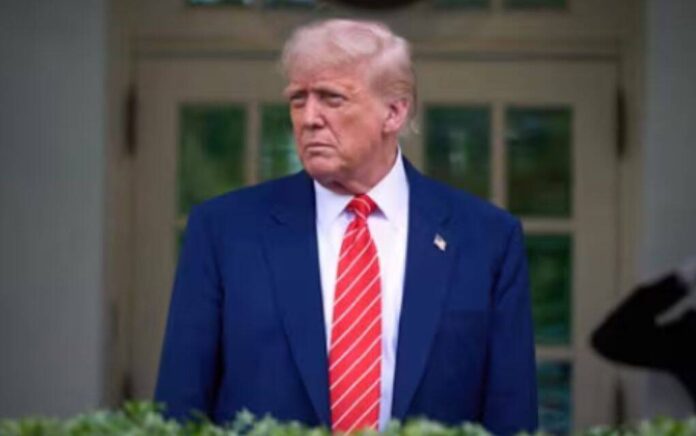
A war has been raging in Congress over the Trump spending bill. Trump thought it was a done deal.
But Congress gave President Trump whiplash with this sudden change of course at the last minute.
Congress Must Act Fast on Trump’s $9.4 Billion Spending Cuts to Deliver for Americans
House Republicans are riding a wave of momentum after the White House delivered its first legislative package targeting $9.4 billion in Department of Government Efficiency (DOGE) spending cuts to Congress on Tuesday. This move, a clear nod to President Donald Trump’s commitment to fiscal responsibility, marks a critical step toward reining in government waste. With the nation’s debt looming large, the urgency for Congress and the White House to align on these cuts has never been greater.
The legislation, dubbed a “rescissions package,” is spearheaded by House Majority Leader Steve Scalise and is slated for a floor vote next week, according to a House GOP leadership statement. Republicans are framing this package as a natural extension of their push to slash spending, building on the $1.5 trillion in cuts over a decade outlined in the House-passed “big, beautiful” bill. The package is a litmus test for whether Congress can match its rhetoric with action.
“There was a lot of us that wish there would be sharper, more current spending cuts [in President Donald Trump’s tax and spending bill], and so following up with that on this [DOGE cuts] keeps the promises that we made to our voters that we are going to cut spending,” Republican Indiana Rep. Marlin Stutzman, a member of the House Freedom Caucus, told the DCNF. His words reflect the sentiment among conservatives that the time for talk is over—action must follow.
The rescissions package targets $1.1 billion in funding for the Corporation for Public Broadcasting, which supports National Public Radio (NPR) and the Public Broadcasting Service (PBS). Additionally, it claws back $8.3 billion in foreign aid, including programs under the United States Agency for International Development (USAID). These cuts are seen as low-hanging fruit for Republicans eager to demonstrate fiscal discipline to their constituents.
While the $9.4 billion in proposed cuts is a fraction of the $175 billion in savings identified by DOGE’s former head, Elon Musk, House Republicans view this package as the first of many. The incremental approach is strategic, aiming to build momentum for larger cuts down the road. With the national debt soaring, every dollar saved counts, and Republicans are keen to show they’re serious about delivering results.
“We have to begin to find savings for the American people, just even a small first step forward in that,” Republican Texas Rep. Michael Cloud, another House Freedom Caucus member, told the DCNF. “This should be an easy vote for Republicans.” He has the full expectation that GOP unity will drive the package through, despite the party’s slim 220-213 majority in the House.
With such a narrow margin, Speaker Mike Johnson can afford to lose only three Republican votes, assuming full attendance and Democratic opposition. The package’s passage hinges on GOP cohesion, as Democrats are unlikely to support measures that curb their preferred programs. Fortunately, Republicans can leverage simple majority votes in both the House and Senate to bypass Democratic resistance.
Not all Republicans are fully on board, however. Moderate Nebraska Rep. Don Bacon, known for occasionally diverging from party lines, has flagged the inclusion of $10 million in cuts to the President’s Emergency Plan for AIDS Relief (PEPFAR) as a potential dealbreaker. Specifically, Bacon called the clawback of funds for PEPFAR, including $3 million for “circumcision, vasectomies and condoms” in Zambia and nearly $1 million for services targeting “transgender people, sex workers and their clients and sexual networks” in Nepal, a “red line” for him, per Semafor.
Conservative Republicans, however, see the rescissions package as a critical test of the party’s commitment to fiscal restraint. The cuts to NPR, PBS, and foreign aid programs are viewed as commonsense reductions that align with the priorities of American taxpayers. For many in the GOP, this is about proving they can deliver on campaign promises.
“We’ll see if Congress can step up to the plate,” Republican Texas Rep. Chip Roy said Tuesday. “If Congress can’t deal with NPR, PBS and a list of crazy expenditures overseas, then they’re not going to rescind.” Roy’s blunt challenge sets the tone for conservatives who are ready to hold their colleagues accountable.
“You can’t send anything to me that I’m not going to vote to rescind,” Roy added. “So fire away.” His enthusiasm for slashing spending resonates with a base frustrated by decades of unchecked government growth. The pressure is on for Republicans to act decisively.
Rep. Marjorie Taylor Greene echoed this urgency, telling reporters that House Republicans should be voting on DOGE cuts every week. “Anytime we can cut foreign aid, I can tell you right now, we can’t cut enough foreign aid, and I think that’s what Americans want to see,” Greene said. “If Republicans can’t find the political will to vote for a $9 billion package, I think Republicans are going to be in trouble because the American people are very adamant about these DOGE cuts.”
While no DOGE-identified savings have yet been returned to the U.S. Treasury, Republicans argue that the president’s cost-cutting efforts are already bearing fruit. The process established under DOGE, they say, is exposing waste and inefficiencies across government agencies. “We finally have a mechanism to really identify much of the waste, fraud, abuse, mismanagement, and even corruption,” Cloud said. “Not only should we be able to transfer that knowledge into savings to the American people, they should be looking at prosecutions for how some of it was mismanaged.”
Cloud also praised the lasting impact of DOGE’s work, noting that the process will outlive Musk’s tenure. “He [Musk] came in and put in a process that will continue to work beyond him,” Cloud said. “There’s a number of agencies that haven’t necessarily gotten their audit yet.” This forward-looking approach suggests that more savings are on the horizon if Congress acts swiftly.
Stutzman highlighted additional areas for scrutiny, such as inefficiencies in the Pentagon and outdated payment systems. “The IRS is still sending out refund checks‚ not even doing an ACH,” he noted, pointing to the electronic system that could reduce fraud. “Talk about ripe for fraud.”
“We’ve got to get serious about this [slashing spending] as Republicans,” Cloud said. “We said this was the moment, a once in a generation, historic moment to correct course in our nation … we’ve got to do what we said we were going to do for the American people.” With the White House and Congress aligned on the need for fiscal restraint, the time to act is now. Delays risk squandering the opportunity to deliver meaningful savings to taxpayers.



















